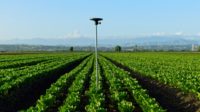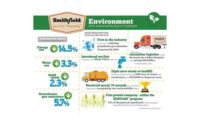Smithfield Foods, Smithfield, Va., ranked No. 1 in water management among leading meat companies in a new report from Boston-based business sustainability organization Ceres.
The Ceres report awards Smithfield 33 out of a possible 100 points in four categories—governance and management; direct operations; manufacturing supply chain; and agriculture supply chain.
"We are proud of the continuous progress we've made in addressing the kinds of water management challenges facing agriculture, and [am] honored that its effort was recognized by a leading not-for-profit sustainability organization," says Larry Pope, president and CEO of Smithfield.
Across its operations, Smithfield has invested in programs and projects to manage water use and mitigate water pollution as part of its mission to provide Good food. Responsibly. These include:
- In 2008, the company set a goal to reduce water use 10% per 100 pounds of product produced by the end of 2015. Smithfield surpassed the goal ahead of schedule with an 18% reduction in 2014. Currently, it is revamping the goals to create further improvements.
- Smithfield constantly considers new projects to reduce or re-use water, including installing a water re-use system at its Tar Heel, N.C., plant that provides more than 1 million gallons of water per day. Additionally, the facility partnered with the Lower Cape Fear Water and Sewer Authority to build a 6 million-gallons-per-day (MGD) water treatment plant supplied by the Cape Fear River to alleviate potential stress on the local groundwater aquifer.
- To address water use in parts of its supply chain, Smithfield is participating in a fertilizer optimization and soils health program designed to improve the efficiency of grain produced in the southeastern United States.
- The company uses Global Reporting Initiative guidelines for public sustainability reporting, and utilized two separate tools to assess water risk both domestically and internationally—the World Business Council for Sustainable Development Water Tool; and the Global Environmental Management Initiative Local Water Tool.
"Even with all these important initiatives, our work isn't over," Pope adds. "Water issues remain one of the most critical risks facing the food industry. The Ceres report notes that one-third of the world's food production occurs in areas of high or extremely high water stress or competition. As a leader in the global meat industry, Smithfield has an obligation to help find solutions to this pressing issue."
"The company's work in water issues aims at constant improvement," says Dennis Treacy, executive vice president and chief sustainability officer for Smithfield. "Our employees know that achieving our sustainability goals and targets is an ongoing process and requires commitment from all of us."



